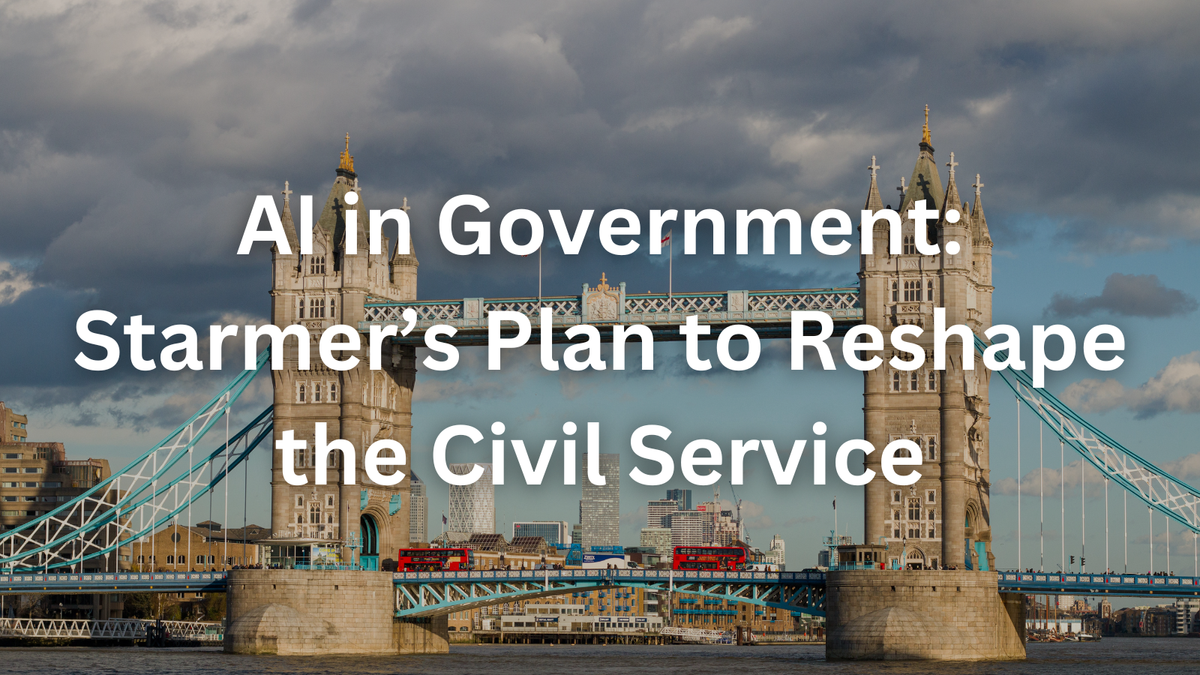AI in Government: Starmer’s Plan to Reshape the Civil Service

The UK government is preparing for a digital revolution, with Prime Minister Keir Starmer pushing for AI to replace certain civil service tasks. The goal? Saving billions and boosting efficiency. But unions are pushing back, warning against job losses and morale issues.
Could AI truly transform government operations, or is this just another cost-cutting exercise? Let’s break it down.
AI in the Civil Service: Starmer’s Vision
Starmer’s government is embracing AI and digital tools to reshape the public sector. His key message:
“No person’s substantive time should be spent on a task where digital or AI can do it better, quicker, and to the same high quality.”
Key Announcements:
💰 £45 billion in savings from digital transformation, even before AI is fully deployed.
📉 Thousands of civil service jobs could be cut in the long term.
🛠️ 2,000 new tech apprentices will be recruited to support digital transformation.
📋 A 25% reduction in regulatory costs, cutting bureaucracy to speed up government processes.
The government believes these changes will make the state leaner and more efficient, ensuring every pound spent delivers for working people.

The Pushback: Unions Raise Concerns
While digital transformation sounds promising, civil service unions aren’t convinced.
What unions are saying:
❌ Job Security at Risk – AI may replace thousands of roles, leaving workers uncertain.
⚠️ Morale Issues – Civil servants feel they’re being blamed for inefficiencies.
💼 Talent Retention Issues – The government may struggle to attract top tech talent without better pay.
Dave Penman, General Secretary of the FDA union, criticized the approach:
“Mantras that look like they’ve been written by ChatGPT are fine for setting out a mission, but spending rounds are about reality.”
Meanwhile, Mike Clancy of Prospect union warns that AI-driven reforms must enhance, not undermine, the civil service. He also argues that the government already has talented specialists who are being underutilized due to funding shortages.
Lessons from the U.S.: A Radical Approach?
Across the Atlantic, Donald Trump’s administration has launched an aggressive government downsizing initiative, led by the Department of Government Efficiency (DOGE) and advised by Elon Musk.
Nicknamed “Project Chainsaw”, this effort aims to cut thousands of government jobs in a bid to streamline bureaucracy. Some fear Starmer’s approach may head in a similar direction—despite his government rejecting the comparison.
A No. 10 spokesperson dismissed these concerns:
“There’s no approach here where we’re taking a chainsaw to the system.”
However, with performance management reforms and potential job reductions, the civil service could still face significant restructuring.

My Take: AI Can Help, But the Transition Must Be Managed Carefully
I agree that AI can significantly reduce government costs, potentially allowing the government to take less money from the public while doing more for the people. A more efficient government means better services, lower taxes, and reduced bureaucracy—which is a huge win for society.
However, my biggest concern is the high percentage of layoffs that will result from AI replacement. If thousands of civil servants lose their jobs all at once, it could create economic instability and public backlash.
A Smarter Approach: Phase-by-Phase Implementation
I believe the government should:
1️⃣ Implement AI in phases, ensuring a smooth transition rather than sudden mass layoffs.
2️⃣ Use AI to recommend alternative jobs for displaced workers, helping them reskill and transition into new roles.
3️⃣ Invest in retraining programs to prepare civil servants for AI-related jobs.
4️⃣ Ensure AI enhances human roles, rather than simply replacing them.
Technology should be a tool for empowerment, not just efficiency. If AI is introduced responsibly, it can transform government operations while minimizing harm to workers.
Final Thoughts: A Digital Revolution or Just Budget Cuts?
If done right, AI could streamline bureaucracy, save billions, and improve efficiency. But if rushed, it could erode trust, damage morale, and create unnecessary job losses.
💬 What do you think? Should AI replace civil servants in some roles, or is this just a cost-cutting move? Let’s discuss on X(Former Twitter)!
References:
- The Guardian: AI Should Replace Some Work of Civil Servants, Starmer to Announce, March 12, 2025.https://www.theguardian.com/technology/2025/mar/12/ai-should-replace-some-work-of-civil-servants-under-new-rules-keir-starmer-to-announce



